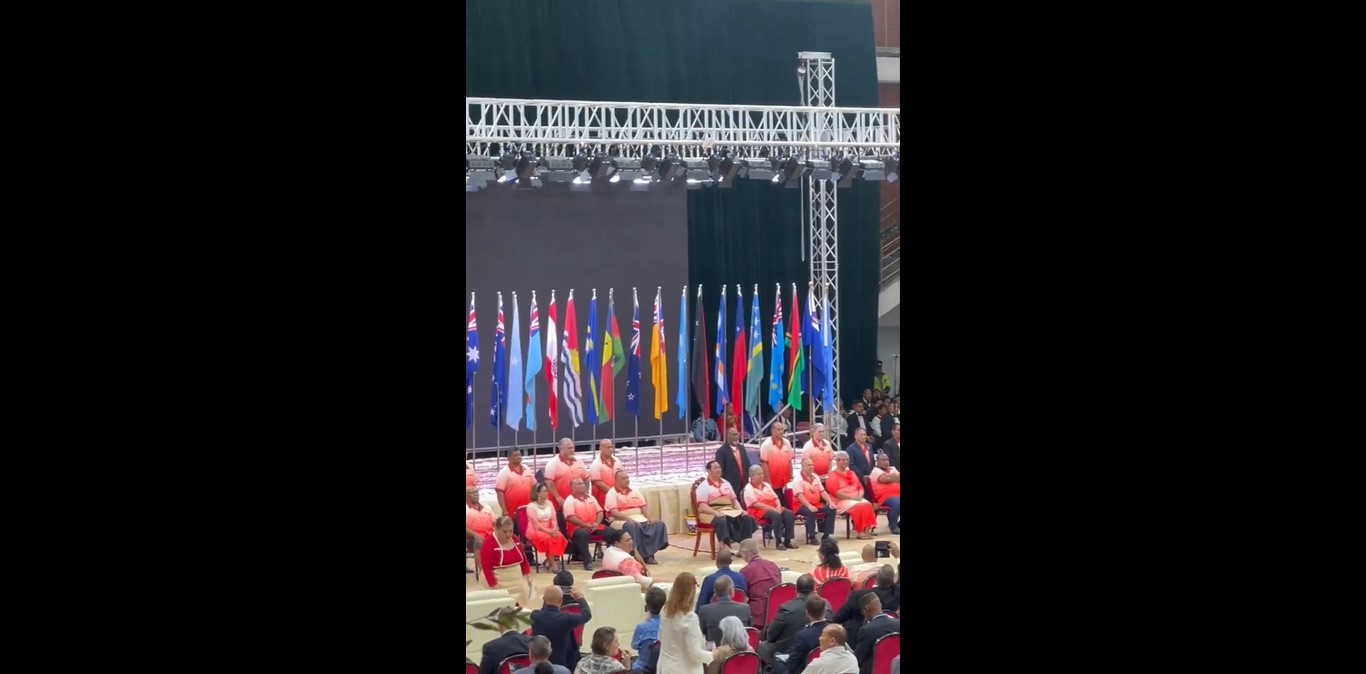
Pacific Island leaders endorse joint policing plan
Pacific Island leaders endorsed a landmark regional policing plan Wednesday at a summit in Tonga, a contentious move seen as trying to limit China’s security role in the region.
Leaders unveiled a plan to create up to four regional police training centres and a multinational crisis reaction force, backed by $271 million in initial funding from Australia.
Under the plan, a corps of about 200 officers drawn from different Pacific Island nations could be dispatched to regional hot spots and disaster zones when needed and invited.
“This demonstrates how Pacific leaders are working together to shape the future that we want to see,” said Australian Prime Minister Anthony Albanese, hailing the agreement.
The Australian leader made the announcement while flanked by leaders of Fiji, Palau, Papua New Guinea and Tonga — a symbolic show of unity in a region riven by competition between China and the United States.
Tongan Prime Minister Siaosi Sovaleni, the summit host, said the initiative would plug regional security gaps and tackle emerging threats like organised crime.
“Tonga, like many other countries, are facing a number of transnational security challenges, including seeing an increase in drug trafficking within the Pacific in recent years” he said.
– The great game –
According to Mihai Sora of the Lowy Institute, a Sydney-based think tank, Wednesday’s announcement was a diplomatic victory for Australia and for the Pacific Islands Forum, a regional bloc which had appeared deeply divided on the topic.
China’s Pacific allies — most notably Vanuatu and Solomon Islands — had voiced concern that the policing plan represented a “geo-strategic denial security doctrine”, designed to box out Beijing.
While all members of the forum have endorsed the deal in principle, national leaders will have to decide how much they participate, if at all.
Tonga’s Sovaleni said Pacific nations will “have the discretion to choose how they would contribute to and benefit”.
Asked about the deal on Wednesday, Beijing said it welcomed “all parties’ efforts for Pacific Island countries’ development and prosperity”.
“China’s cooperation with Pacific Island countries on police, law enforcement, and in other fields is normal cooperation between sovereign countries,” foreign ministry spokesman Lin Jian said.
“It complies with international law and norms and isn’t aimed at, or constrained by, any third party,” he added.
– Partner of choice? –
Australia and New Zealand have historically been the region’s go-to security partners, leading peacekeeping missions in Solomon Islands and training in Nauru, Fiji and Papua New Guinea.
Policing, however, has increasingly become a cornerstone of Beijing’s efforts to build Pacific influence.
China tried and failed to ink a region-wide security pact in 2022, but has since been plying some under-resourced Pacific police forces with martial arts training and fleets of Chinese-made vehicles.
Australia and longtime ally the United States were caught napping in 2022 when China secretly signed a security pact with Solomon Islands — the details of which have not been made public.
China now maintains a small but conspicuous police presence there, sending a revolving cadre of officers to train locals in shooting and riot tactics.
Gleaming new police vehicles roam the capital Honiara emblazoned with the Royal Solomon Islands Police Force badge and stark red “China Aid” stickers.
Earlier this year, Beijing also started sending teams of police advisers to Kiribati.
There are fears in Washington that China may one day parlay these agreements into a permanent military foothold in the region.
– ‘Not yet done’ –
According to the Lowy Institute’s Sora, Canberra will hope it helps “close the window for China to seek a regional security agreement”.
Papua New Guinea’s Foreign Minister Justin Tkatchenko told AFP on Wednesday that his country was keen to “work together with Australia” to implement the proposal.
But others signalled lingering misgivings.
Top Solomon Islands’ diplomatic official Colin Beck told AFP that Honiara would have domestic discussions about the plan before anything is finalised.
“We have a national process that we have to dive into it,” said Beck, permanent secretary of the Ministry of Foreign Affairs.
“We are basically reviewing our national security strategy and everything, so it will be part of the conversation,” he said.
“The matter is still going on. The forum is not yet done.”
Stay Updated with news.freeptomaineradio.com’s Daily Newsletter
Stay informed! Subscribe to our daily newsletter to receive updates on our latest blog posts directly in your inbox. Don’t let important information get buried by big tech.
Current subscribers:



